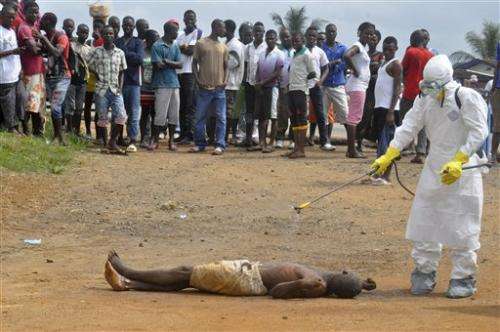UN goal: Stop Ebola transmission in 6-9 months

The United Nations is establishing an "Ebola Crisis Center" with a goal of stopping transmission in affected countries within six to nine months, the U.N. chief said Friday, as the death toll from the outbreak surpassed 2,000 for the first time.
The World Health Organization said the number of people who have died in the outbreak has reached 2,097 across five West Africa countries, with about half the deaths in Liberia.
Secretary-General Ban Ki-moon told reporters after a meeting with senior U.N. leaders that $600 million is urgently needed for supplies to combat Ebola in West Africa.
He again urged airlines and shipping countries to lift their bans on flights and port visits so doctors, nurses, beds, medical equipment and supplies can reach those in need.
"This is a huge serious challenge," he said. "We are organizing to meet it and I am convinced we can succeed."
The New York-based Ebola Crisis Center will coordinate efforts of the U.N., aid organizations, governments, the private sector, financial institutions and other grassroots groups to bring "synergy and efficiency" to the effort to end the outbreak, he said.
"The number of cases is rising exponentially," Ban said. "The disease is spreading far faster than the response. People are increasingly frustrated that it is not being controlled."
In Sierra Leone, a physician said Friday that health care in the capital city of Freetown has "crumbled" because the Ebola outbreak has made people too terrified to go to hospitals and some doctors are wary of treating those who do show up.
Speaking at the launch of a public education program in Freetown, Kwame O'Neil said patients suffering from all kinds of ailments are dying for lack of treatment because of these fears.
One young girl died of appendicitis when, after showing up at a hospital, a doctor there denied he was a doctor and refused to treat her, O'Neil said, and his own aunt died after suffering a stroke and being left untreated at a hospital for two days.
Ebola is a deadly disease for which there is no known cure and which is spread through contact with bodily fluids.
Sierra Leone has recorded 1,107 confirmed cases and 430 confirmed deaths of Ebola, according to the World Health Organization. But the country's health ministry says most are outside the capital.
In Liberia, officials confirmed Friday that a police barracks in central Monrovia was shut down after the wife of one of the officers died of Ebola.
Information Minister Lewis Brown said the officers decided to "self-quarantine." About 35 officers live in the barracks with their families, said Abraham Kromah, deputy director of the national police force.
Liberian Christian leaders planned to convene about 100 "prayer warriors" at a historic church in the capital to drive out Ebola, said Rev. Kortu Brown, vice president of the Liberian Council of Churches.
The event was being held at the Providence Baptist Church, where Liberia's declaration of independence was signed in 1847.
"It is where Liberia has always prayed in the past when it was confronted," Brown said.
A state of emergency in Liberia restricts public gatherings, though church services have largely continued unimpeded.
In an article published in Time magazine, Dr. Kent Brantly, an American who contracted Ebola in Liberia and who survived after receiving an experimental treatment in the United States, said the world needs to act.
"Ebola has changed everything in West Africa," Brantly wrote in his first-person account. "We cannot sit back and say, 'Oh, those poor people.' We must think outside the box and find ways to help."
© 2014 The Associated Press. All rights reserved.
















